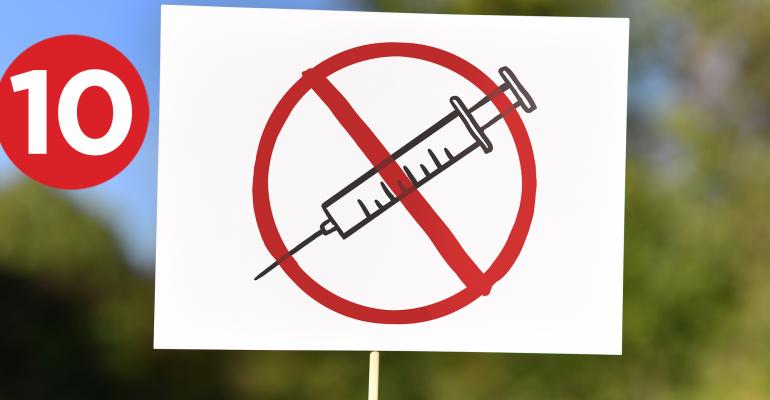- Proptech firm Entrata’s chairman resigns after anti-vax conspiracy email “David Bateman, co-founder and former CEO of Utah-based Entrata, the unicorn multifamily property management platform, sent an email to more than 50 investors and Utah tech and political leaders early Tuesday morning entreating them to oppose vaccinations, which he claimed were destroying people’s immune systems and part of a broader Jewish conspiracy.” (The Real Deal)
- Supply Chain Woes Prompt a New Push to Revive U.S. Factories “Companies like America Knits will test whether the United States can regain some of the manufacturing output it ceded in recent decades to China and other countries. That question has been contentious among workers whose jobs were lost to globalization. But with the supply-chain snarls resulting from the coronavirus pandemic, it has become intensely tangible from the consumer viewpoint as well.” (The New York Times)
- More restaurant employees are quitting than in any other industry, recent data shows “For restaurant operators experiencing labor shortages every day in the trenches, these numbers are not surprising. Restaurant job growth has largely remained stagnant over the second half of 2021, and restaurant owners are scrambling to offer higher wages, benefits and even unique benefits to attract and retain employees like buying workers cars or paying student employees to do their homework during shifts.” (Nation’s Restaurant News)
- Port of Los Angeles traffic sets record in 2021 “The parking lot of ships doesn't exist anymore — but that's because the ports have slowed the rate at which ships come in. Forty-five ships are slowly drifting toward the port of Los Angeles about 150 miles offshore. "It's called port optimization.” (CNN)
- Architects At Major Firm Pushing To Unionize. Why Real Estate 'Should Be Worried' “This push by professional workers to organize symbolizes a number of dynamics at play in the workforce, especially within highly credentialed members of the architecture, construction and engineering world. It underscores how younger adult workers today view unions and expect more from their employers.” (Bisnow)
- Walmart expanding grocery delivery inside customer homes to 30 million homes “The discount giant plans to expand the accessibility of its InHome delivery service from its current range of 6 million U.S. households to 30 million U.S. households by the end of 2022. To support this growth, Walmart intends to hire more than 3,000 delivery drivers this year, as well as build out a fleet of 100% all-electric delivery vans.” (Chain Store Age)
- Underused Office Buildings Get New Life as Deluxe Apartments “Until recently, developers mostly looked to convert early to mid-20th century office towers located in downtown districts, properties that tend to have relatively compact dimensions that make them ideal for apartments. But many empty office buildings are more like the Park and Ford. They are newer, more voluminous and often located somewhere off the interstate.” (The Wall Street Journal)
- Workers at the first unionized Starbucks store walked out on Wednesday, alleging COVID-19 safety issues “Six workers walked off the floor, the union and Starbucks confirmed, while three others remained. The remaining workers were ‘fearful that they would either be fired or wouldn't be able to pay their rent,’ Starbucks Workers United told Insider.” (Insider)
- New York’s transit agency is its lifeblood. The pandemic puts its future at a crossroads “Such a steep decline in revenues would need to be addressed by revisiting a mix of solutions tried before, such as cutting service, raising fares, and issuing debt. Service cuts and higher fares often can mean a death spiral for public transit agencies, since attaining regular ridership depends on reliable, accessible service. That’s one reason public transit agencies around the country, including in Albuquerque, New Mexico, and Tucson, Arizona, have been experimenting with free service in recent months.” (Marketwatch)
- Omicron variant likely to fuel inflation, as Americans keep shopping rather than dining out and traveling, retail trade group economist says “The spike in coronavirus cases has prompted retailers and restaurants including Starbucks, Apple, Nike and Gap-owned Athleta to shut stores or shorten hours, as they cope with short staffing or step up sanitizing. Walmart temporarily shut nearly 60 U.S. stores in coronavirus hotspots last month to sanitize them. Macy’s said Tuesday that it is reducing store hours for the rest of the month.” (CNBC)
0 comments
Hide comments





